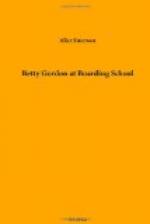THE MYSTERIOUS FOUR
“Well, for mercy’s sake!” said Betty in exasperation, “if you know where the property is, why don’t you claim it? Why doesn’t your mother? Where is it?”
“At the bottom of Indian Chasm,” declared Norma calmly.
“Where’s that?”
“I don’t know exactly,” admitted Norma. “It’s around here somewhere. You see the Indians streaked for the woods, and mother got out by way of a window and ran to the next estate. The men and boys there armed themselves and took horses and chased the Redskins, and when they were almost up with them the robbers tossed everything down this great canyon in the earth. There was no way to get into it, and though they tried lowering men with ropes, they couldn’t find a solitary gold piece. As far as any one knows it is all at the bottom of the chasm now.”
“And grandma had to mortgage the house and they couldn’t pay the interest and it was sold and all the lovely mahogany furniture,” mourned Alice. “And grandma and mother moved to New York and mother taught school and met dad, who was a medical student. And they were married when he graduated, and grandma came to live with ’em.”
Betty crept away to her own bed when the story was finished. Bobby was asleep, for which her chum was thankful. Betty wanted to think. Surely there must be a way to recover the Macklin fortune, if it was still down in the big chasm.
“I’ll tell Bob and we’ll go and find that place. Perhaps he can think of a plan,” was Betty’s last thought before she went to sleep.
The next few days were very busy ones for every pupil. Ada and Ruth, in tears, submitted to having their wardrobes censored, and thereafter appeared in clothes that were not too striking.
The appointments with Mrs. Eustice materialized, and Betty, after her interview, was conscious of a sincere affection for the woman who seemed to understand girls so thoroughly.
Bobby was “crazy,” to quote her own expression, about the gymnasium classes, and Miss Anderson beamed approvingly upon her. Betty, too, was often to be found in the gymnasium after school hours, but Libbie had to be driven to regular exercise. She liked to dance, but unless some one was made responsible for her, she was prone to cut her regular gymnasium period and devote the time to some thrilling novel. When the other girls discovered this they good-naturedly made up a schedule for the week, assigning a different day to every girl whose duty it should be to “seal, sign and deliver” the reluctant Libbie at the gymnasium door at the appointed time.
Mrs. Eustice, rather peculiarly some people thought—Ada Nansen’s mother among them—held the theory that school girls should spend a fair proportion of their time in study. She had small patience with the faddist type of school that abhorred “night work” and whose students specialized on “manners” to the neglect of spelling.




